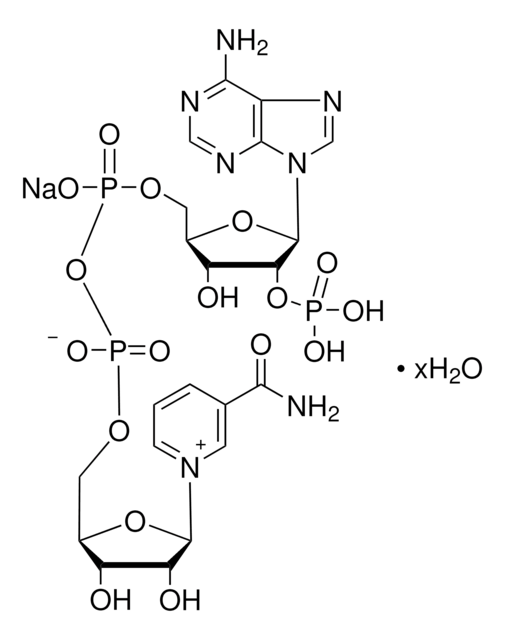MAK479
NADP/NADPH Assay Kit
sufficient for 100 colorimetric tests
Sign Into View Organizational & Contract Pricing
All Photos(1)
About This Item
UNSPSC Code:
12161503
NACRES:
NA.84
Recommended Products
General description
Pyridine nucleotides play an important role in metabolism and, thus, there is continual interest in monitoring their concentration levels. Quantitative determination of NADP+ /NADPH has applications in research pertaining to energy transformation and redox state of cells or tissue.
Features and Benefits
- The linear detection range of the kit is 0.1 µM to 10 µM NADP+ /NADPH
- Compatible with high-throughput handling systems.
- Convenient, the procedure involves adding a single working reagent, and reading the optical density at time zero and 30 minutes at room temperature.
Suitability
The kit is suitable for detection of NADP+ /NADPH concentrations and ratios in cell or tissue extracts.
Principle
The NADP/NADPH Assay Kit is based on a glucose dehydrogenase cycling reaction, in which the formed NADPH reduces a formazan (MTT) reagent. The intensity of the reduced product color, measured at 565 nm, is proportionate to the NADP+ /NADPH concentration in the sample. This assay is highly specific for NADP+ /NADPH and is not interfered by NAD+ /NADH.
signalword
Danger
hcodes
Hazard Classifications
Eye Irrit. 2 - Flam. Liq. 2 - Met. Corr. 1 - Skin Irrit. 2 - STOT SE 3
target_organs
Respiratory system
Storage Class
3 - Flammable liquids
wgk_germany
WGK 2
Certificates of Analysis (COA)
Search for Certificates of Analysis (COA) by entering the products Lot/Batch Number. Lot and Batch Numbers can be found on a product’s label following the words ‘Lot’ or ‘Batch’.
Already Own This Product?
Find documentation for the products that you have recently purchased in the Document Library.
Our team of scientists has experience in all areas of research including Life Science, Material Science, Chemical Synthesis, Chromatography, Analytical and many others.
Contact Technical Service






